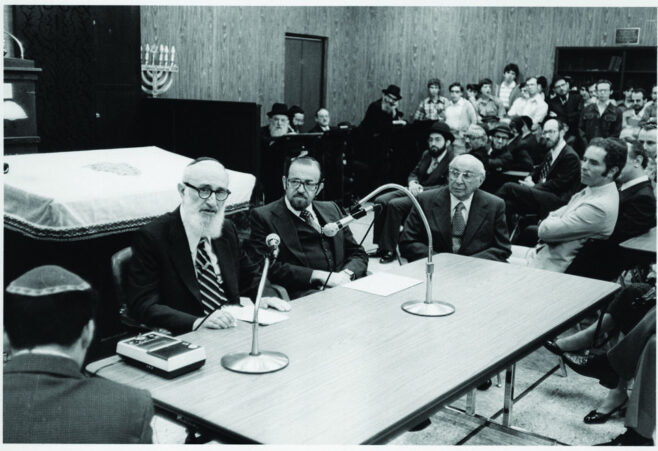
January 8, 2020
An extraordinary address by the Rav, Rabbi Joseph Ber Soloveitchik at a Chassidic farbrengen in Boston in 1968 dispels the foundations of the opposition to Chassidus and reveals that the reason the Vilna Gaonrefused to meet the Alter Rebbe.
By COLlive reporter
An audio recording of Rabbi Joseph Ber Soloveitchik, the “Rav” who was the outstanding figure of modern Orthodox Judaism in 20th century America, is said to have profound historic significance as it authoritatively refutes the traditionally accepted basis for opposition to Chassidus.
The recording is of an extraordinary address that the late Rosh Yeshiva of Rabbi Isaac Elchanan Theological Seminary (RIETS) at Yeshiva University in New York City gave at a Yud Tes Kislev Farbrengen in Boston, Massachusetts in 1968 celebrating the Rosh Hashana of Chassidus.
In this captivating oration, Rav Soloveitchik dispels the foundations for this widely accepted approach to the opposition to Chassidus prevalent in the Litvish yeshiva world. Rav Soloveitchik’s authority in this topic is based on his family traditions, as a scion of the Brisker dynasty and a direct descendant of the most foremost disciple and primary spiritual heir of the Vilna Gaon, Rav Chaim of Volozhin, who founded the Volozhin yeshiva, which became the mother of all Lithuanian-style yeshivas.
In his talk, Rav Soloveitchik attested that his family tradition confirms the attempt of the Alter Rebbe to visit the Vilna Gaon in an attempt to persuade him to abandon his opposition to Chassidus (except that in the Brisker family tradition it was Rav Levi Yitzchok of Berdichev who accompanied the Alter Rebbe on this visit, whereas according to Chabad tradition, as recorded by the Alter Rebbe himself in his Igros Kodesh letter 52, it was Rav Mendel Horodoker).
The Rav then revealed that the reason the Vilna Gaon refused to meet the Alter Rebbe was because the Vilna Gaon was so awestruck by the holy countenance of the Alter Rebbe (which he saw through a crack in his door) that he felt that if he allowed the Alter Rebbe in, he would be persuaded to leave hand-in-hand with the Alter Rebbe and would (not only desist from opposing him, but, on the contrary, would) join him in spreading Chassidus
The Rav contended that although Rav Chaim Volozhiner wrote his magnum opus “Nefesh Hachaim” at the request of the Vilna Gaon with the express purpose to contradict and refute the contents of the Tanya and demonstrate that its philosophy is contrary to the accepted beliefs of Torah – in reality, the opposite is true and the Nefesh Hachaim overwhelmingly confirms the tenets, principals and beliefs articulated by the Alter Rebbe in the Tanya (and the areas of apparent disagreement are marginal and primarily semantical).
He then concludes that, based on all the above facts and factors, the historic opposition to Chassidus was unwarranted and all its tragic consequences in dividing the Jewish people into two hostile camps (resulting in such malefactions as the mesira of the Alter Rebbe to the Russian government and his imprisonment) was misinformed and misguided and only due to the efforts of “slander-mongers, troublemakers, psychopaths and corrupt individuals who found malicious delight in promoting feud and hate.”
Calling himself “a Clandestine Chabadnik,” the Rav said that Chabad chassidim who populated the cities in Lithuania and Russia where he grew up, were talmidei chachamim, lomdim and devout Jews of the highest caliber.
A Chabad chossid who heard the recording told COLlive.com that “It should be noted, however, that the Alter Rebbe wrote (Igros Kodesh of the Alter Rebbe letter 52) that there were irreconcilable differences regarding basic tenets between the Alter Rebbe and the Vilna Gaon (since the Vilna Gaon did not accept the kabbalah of the Arizal in its entirety).
As a reference, he pointed to the Rebbe’s letter to Rav Eliyahu Eliezer Dessler regarding the areas of agreement and disagreement between the Tanya and the Nefesh Hachaim in Igros Kodesh I:11 and 3:551, and also Heichel Baal Shem Tov vol. 4 page 39-48.